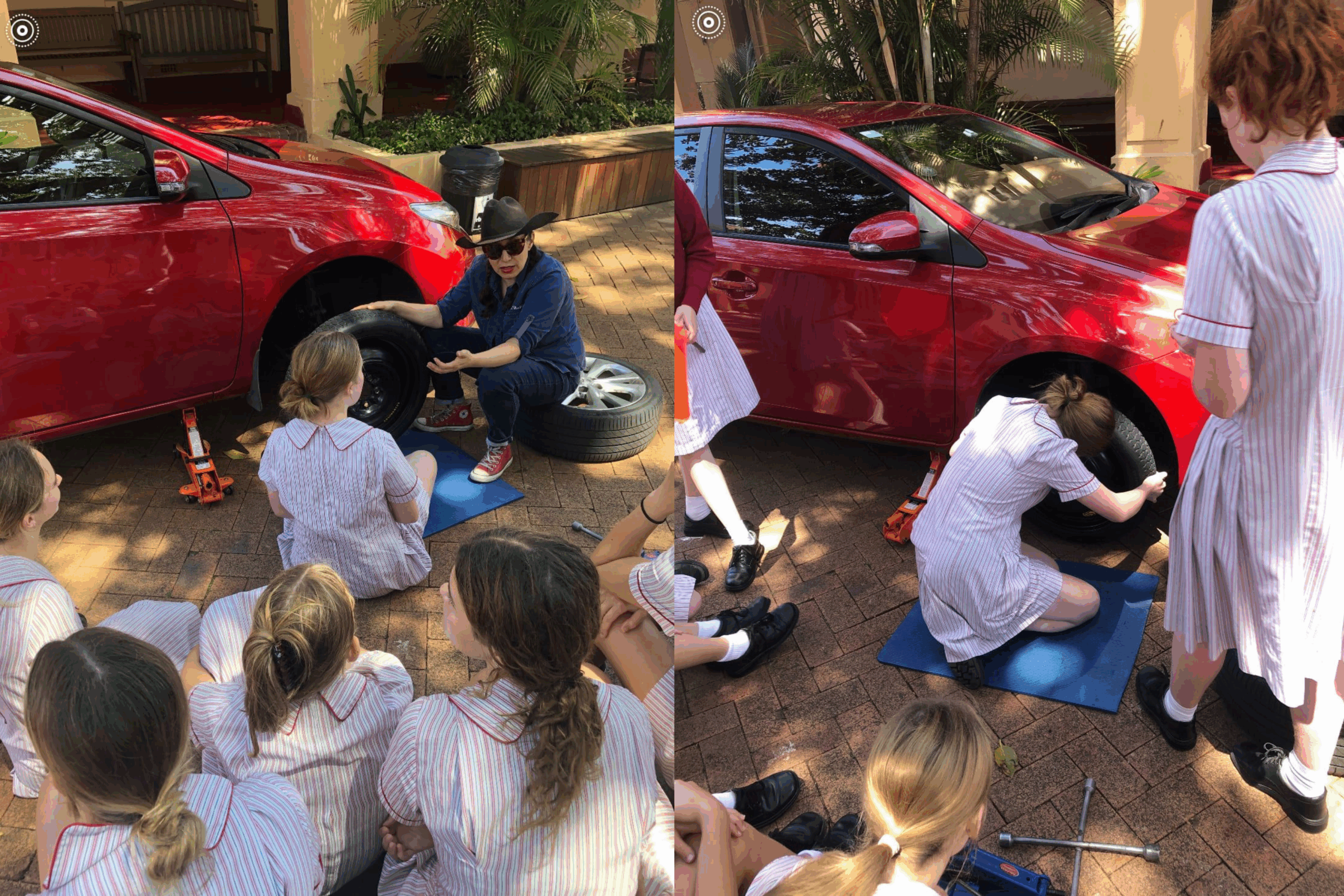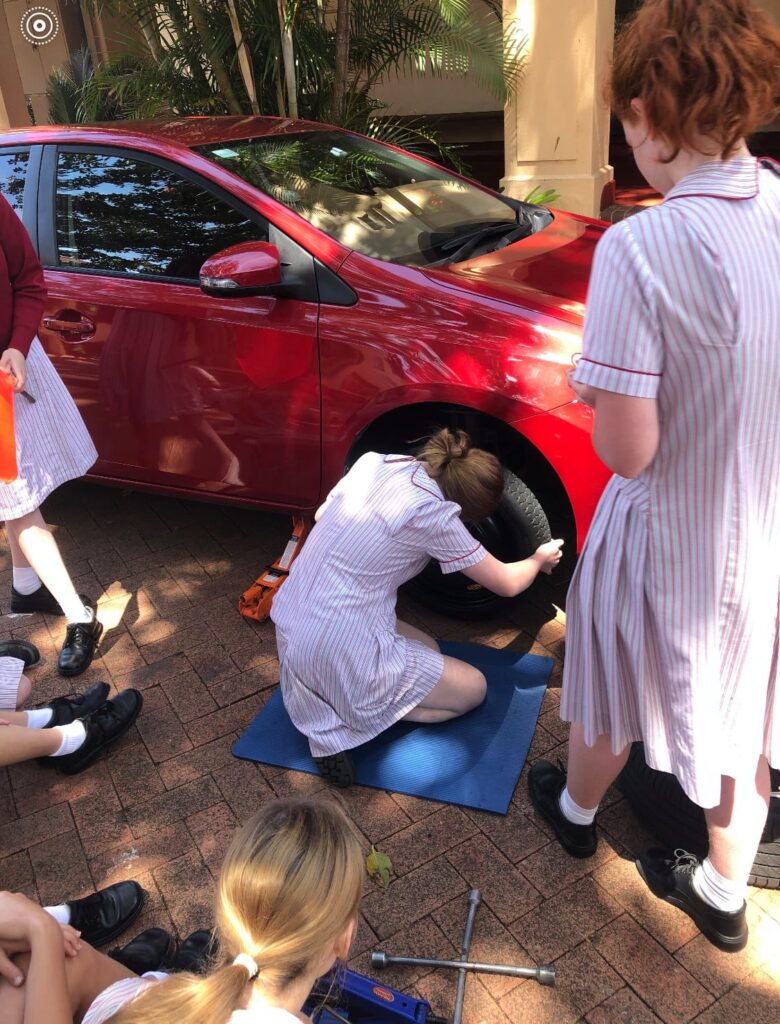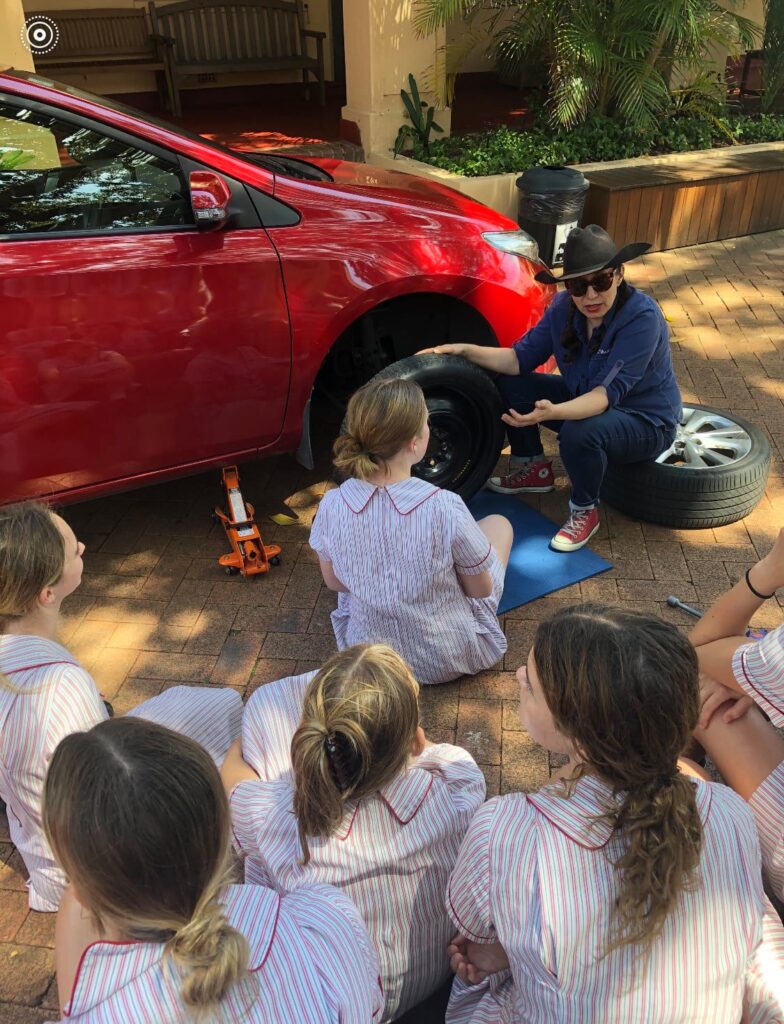This School Is Teaching Teen Girls Important Life Skills Like Changing Tires and Other Car Maintenance

A car stalls on a quiet road. The sun dips low, and the traffic is long gone. For some, that moment sparks panic. For others, it’s just another problem to solve.
Confidence in life often comes down to the skills we carry—the ones that keep us safe when no one else is around. But in many classrooms, equations and essays take center stage, while the lessons that prepare us for life’s unexpected detours are left waiting in the wings.
Beyond Stereotypes, Into Real Independence
Picture this: your car jerks to a stop on a quiet road. There is no service station in sight. The air is heavy with that sinking feeling as the question rises in your mind: What now?
For many, that moment triggers panic. For someone who knows how to pop the hood, check the oil, or change a flat tire, the experience is completely different. It is not fear. It is freedom.
At a school in Sydney, a group of Year 11 girls recently experienced that feeling of freedom for the first time. Instead of only solving equations or analyzing novels, they picked up lug wrenches and learned the kind of lessons life does not always teach in a classroom. Partnering with Galmatic, a team that has taught over 100,000 teens the art of car care, these young women were not just fixing tires. They were fixing a gap in the way we prepare our kids for the real world.
Independence is not handed to you. It is built, one skill at a time. Sometimes, the first spark of confidence comes from knowing you can keep moving forward even when the road throws you a flat.
Why Practical Life Skills Matter in Schools
Imagine graduating with top grades but no idea how to change a flat tire or check your car’s oil. Today’s education systems focus on academics, but many graduates feel unprepared for real-world demands—from basic DIY tasks to managing stress and decision-making under pressure. A recent national survey of U.S. teens aged 13–18, including 273 4‑H participants, found that about 80% believe they will achieve their career and life goals, yet many still report lacking essential technical and life skills—including stress management and financial literacy
Life skills education does more than simply teach a task—it builds emotional intelligence, self-efficacy, and resilience. A study published in BMC Public Health evaluated an intervention for adolescents and found measurable improvements: school attendance rose by 66%, perceived self‑efficacy increased by an average of 4%, resilience by 1.1 points, and egalitarian gender attitudes by 0.45 points BMC Public Health. These aren’t abstract benefits—they translate into stronger, more confident individuals ready to navigate challenges.
The World Health Organization defines life skills as competencies such as decision-making, problem-solving, communication, empathy, and emotion management. These are the invisible tools people rely on when the unexpected happens. Education doesn’t stop at equations and essays. Life skills are equally fundamental to success.
In the UK, only one in five voters believe schools are effectively preparing children for the workplace. Employers also emphasize that young people lack essential soft and practical skills. A PwC poll involving 1,200 UK businesses pointed out a strong need for critical thinking, adaptability, and lifelong learning—skills often absent from traditional curricula.
Adolescence is a critical window for developing these skills. Research by the University of Sydney and IZA shows that secondary education can strengthen life skills like grit, self-control, and problem-solving—though more work is needed to measure and teach them consistently. Complementing that, guidance from Positive Action argues that modern curricula must include real-world competencies like time management, financial literacy, DIY tasks, and mental health coping strategies if we want young people to thrive in the 21st century.
In short, life skills education bridges the gap between academic knowledge and real independence. It empowers students not just to think, but to act—with confidence, responsibility, and compassion.
Stella Maris College and Galmatic: What Happened and Why It Matters
In Sydney, Australia, Stella Maris College decided to turn theory into action. The school organized a hands‑on car maintenance workshop for its Year 11 girls, inviting Galmatic, a female‑led automotive education team, to teach the essential skills many young drivers never learn.

During the session, groups of around forty students learned step by step how to handle real‑world car scenarios. They practiced changing a tire, checking oil and coolant levels, reading tire pressure, and knowing what to do after a minor accident or roadside emergency. These were not abstract lessons—they were the kinds of experiences that can prevent breakdowns from becoming crises and transform nervousness into confidence.
Galmatic, founded by Eleni Mitakos, has taught car safety and maintenance to over 100,000 teenagers across Sydney every year, and the team’s mission goes beyond car care. Reinforcing this notion, Mitakos said, “The primary aim is for teenagers to feel comfortable behind the wheel. Ultimately they are driving very big vehicles which can be very expensive if not looked after properly. We can’t stress enough to all our students. You should never ignore a problem with your car, you need to address it for your own safety.”
The school described the event as part of its “Essential Life Skills” program, emphasizing that independence and resilience are just as important as academic achievement. Teachers and parents praised the initiative for empowering young women to be resourceful and safe, particularly in situations where immediate help is unavailable.
Moments like this are more than lessons. They are mindset shifts. A flat tire is no longer a threat—it becomes a problem that can be solved. And every time a young person realizes they can solve a problem on their own, the foundation of lifelong confidence grows stronger.
The Community Reaction: Applause for Life Skills in Action
When Stella Maris College shared its initiative online, the response was immediate and overwhelmingly positive. Parents, alumni, and community members celebrated the school’s focus on empowering young women with practical life skills that go beyond the classroom.
One mother, Kathryn Bran, who has a daughter in Year 11 and is an alumna herself, called it a “really worthwhile session” and even shared that it became a lively dinner table conversation about safe and knowledgeable driving.

Other community members reflected on how much education has changed. Maureen Murphy remarked, “School was never like this back in the 50’s.” Another commenter, Nina Gordon, praised the program as “really smart” and added that it should be taught everywhere.

Former students also weighed in. Peta Brown highlighted that while she had taken automotive electronics as a physics elective years ago, this dedicated workshop gave students a more practical, confidence‑building experience. Patricia Brizzi summed up the sentiment shared by many: “…all high schools, especially girl schools should do this and learn from this!”

Many parents saw this not just as a lesson in mechanics, but as a lesson in independence and strength. Vicky Jones commented that she wished she could have joined the class, applauding the school for teaching girls “how to be strong and independent.” Kristy Smith called it the type of education “our kids need in every school”, and Sandra Sieb even joked about wanting a session for mums.

These reactions reflect more than admiration—they reveal a growing awareness that life skills are essential for modern education. Communities are hungry for schools to prepare students not just for exams, but for life itself.
Real‑World Lessons in Confidence and Safety
Confidence often grows in the quiet moments when a young person realizes, I can handle this on my own. For the girls at Stella Maris College, that realization came not from reading a textbook, but from hands-on experience that turned uncertainty into action.
Assistant Principal Amy Smith shared that students left the workshop with a visible sense of self‑assurance. What began as a lesson in car care became a lesson in self‑reliance. This confidence extends far beyond the road. When young people know they can face unexpected challenges, whether it is a flat tire or another real‑world problem, they carry themselves differently.

Founder Eleni Mitakos has seen this transformation repeatedly through Galmatic’s programs. She notes that practical skills do more than solve immediate problems—they protect, empower, and instill a lifelong sense of capability.
Workshops like this do more than teach a task. They rewrite the story of what young women are capable of, replacing hesitation with readiness and fear with freedom.
Actionable Skills Every Teen Should Learn
Practical life skills are more than checklists. They are stepping stones to independence, safety, and confidence. For teens, learning even a handful of essential tasks can transform the way they navigate the world. Here are the core skills that every young person should know, explained in detail to show why they matter in real life:
1. Change a Tire with Confidence
Knowing how to replace a flat tire can turn a roadside emergency into a simple task. Teens should practice using a car jack, loosening lug nuts, and safely installing a spare tire. Beyond saving time and money, this skill reduces vulnerability when driving in remote or low‑traffic areas.
2. Check and Maintain Tire Pressure
Driving with the correct tire pressure improves fuel efficiency and prevents dangerous blowouts. Learning to use a tire pressure gauge, identify the recommended PSI, and top up air when needed teaches both safety and preventive care.
3. Monitor Oil and Coolant Levels
Low engine oil or coolant can damage the car and leave a driver stranded. Teens should know how to locate the dipstick, check oil color and level, and refill coolant properly. These simple checks prevent costly repairs and reduce the risk of breakdowns.
4. Respond Safely After a Breakdown or Minor Crash
Life is unpredictable. Knowing what to do after a fender‑bender or a stalled engine can prevent panic and keep everyone safe. Teens should learn to secure the area, turn on hazard lights, move to safety if possible, and call for assistance.
5. Perform Basic Preventive Checks
Regularly inspecting tire tread, battery condition, and fluid levels builds a habit of proactive maintenance. These checks extend a vehicle’s life and give young drivers peace of mind before every trip.
These skills are more than mechanical routines. They are small but powerful acts of independence. When young people master them, they gain more than the ability to keep a car moving. They gain the confidence to keep their lives moving forward, knowing they can respond to challenges instead of waiting for rescue.
Turning Flat Tires into Freedom
True education is not just about passing exams. It is about facing life and saying, I can handle this. When a student learns to change a tire or check the oil, she is not just fixing a car. She is claiming her independence.
Stella Maris College showed that a simple skill can spark a shift in mindset. Fear turns into freedom. Hesitation turns into action. A young person who can solve a problem on the side of the road can carry that same courage into every challenge life throws at them.
The world will always have its flat tires—literal and figurative. The question is, will you wait for someone else to rescue you, or will you take the wrench in your own hands?
Featured Image from Stella Maris College, Manly on Facebook
Loading...

